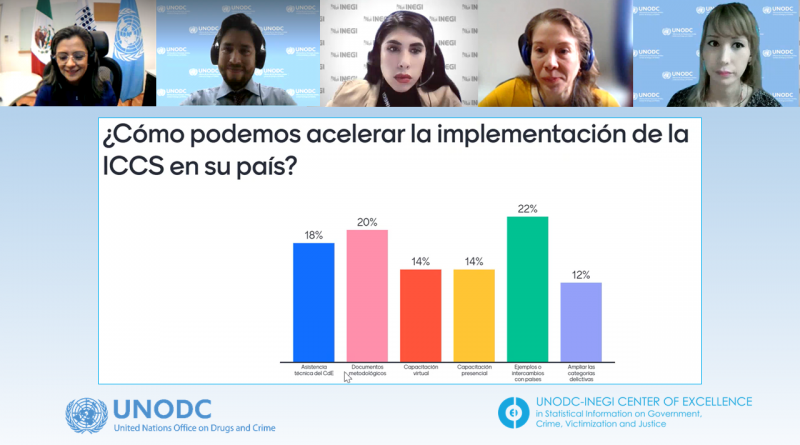Latin American countries gather at the first Regional Exchange Forum on ICCS Adoption
On February 1, the UNODC-INEGI Center of Excellence (CoE) organized the first Regional Exchange Forum on the Adoption of the International Classification of Crime for Statistical Purposes (ICCS). Participants included institutions from across the Latin American region such as the Ministry of Justice of Argentina, the Judiciary Council of Ecuador, the Supreme Court of Justice of Nicaragua, the Honduran Observatory on Drugs, the Statistics Department of the Attorney General’s Office of El Salvador, as well as the national statistical offices of Mexico, Peru, Costa Rica, Paraguay, Colombia, and the Dominican Republic, and the Department of Public Security of the Organization of American States (OAS).
Mrs. Salomé Flores, from the CoE, kicked off the forum by providing the countries with an update on the degree of ICCS implementation in Latin America, according to data reported in the United Nations Survey on Crime Trends and Operations of Criminal Justice Systems (UN-CTS). She noted that seven countries in the region have reported progress, and three already have a new national crime classification developed in line with the ICCS. Also, from the CoE, Mr. Roberto Murguía reported on the upcoming tools available in 2023; such as a mobile application, an online course and a manual; to enable countries to effectively make progress in the implementation of the classification.
Afterwards, Mrs. Juliana Mosquera Dueñas, from the National Administrative Department of Statistics (DANE), presented the process of adoption of the ICCS, which included awareness-raising workshops, coordinated work with institutions specialized in the crimes of each section of the classification and a public consultation. All this work culminated in the International Classification of Crimes for Statistical Purposes Adapted for Colombia (ICCS A.C.) in December 2020.
On behalf of the National Institute of Statistics and Geography (INEGI), Mrs. Diana García Ortiz pointed out the specificities of the adoption of the ICCS in a federated country like Mexico. She emphasized that the process was complex due to the lack of standardization of terms in the institutions that produce data on crime and criminal justice. Mexico currently has the Technical Standard for the National Classification of Criminal Offenses for Statistical Purposes, which is aligned with ICCS. They are currently considering an update of the Standard to include emerging crimes such as cyberbullying, child grooming or crimes against animals.
In total, more than 50 persons representing different Latin American institutions were able to learn about the experiences of other countries in the implementation of the ICCS, as well as the challenges for its adoption and the actions that have been taken to overcome them. The forum enabled countries to exchange best practices, broaden their knowledge of the region’s experiences in adopting ICCS and learn about the resources available to them to initiate or resume implementation of the classification.



